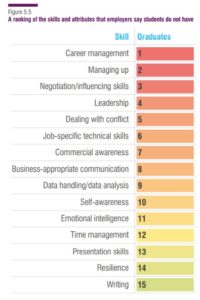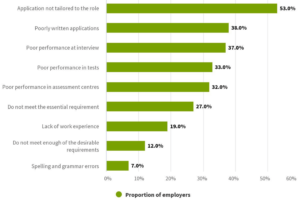Claire Guy is an Employability and Careers Consultant at the University of Exeter.
For many international students, understanding what UK employers are looking for can be difficult. In my experience, many UK students don’t understand it too well either. That’s why UK universities, including the University of Exeter, have qualified, experienced careers practitioners providing a wide range of information, advice and personalised guidance to help you with your future plans. We support you to present yourself in the very best light and really shine in your job applications.
Like many things in life, creating a career plan and implementing it is a much more complicated process than most people realise. The modern world of work is more complicated than it ever has been. The graduate job market is competitive with large numbers of students and graduates applying for opportunities. One of the challenging things about applying for graduate roles is that there are many misunderstandings or myths about what employers are looking for, and often students spend their time and energy on things that employers don’t value that much instead of focusing on what employers are actually interested in.

So what are UK employers looking for?
The UK is fairly unique in that most graduate employers are not very interested in your degree subject. There are of course some exceptions, such as employers who look for engineering degrees or those seeking a graduate with a statistics based degree. But on the whole, the biggest proportion of graduate employers will welcome graduates from any subject/discipline.
This means that they are not looking for specific technical knowledge from a university course, but are instead looking for students who can be shaped and trained by the organisation, who have the potential to grow into a role. The way that they judge potential is to assess whether you have the skills that they think are important. You will know what skills each employer is looking for because they will tell you in the role description or job details. Each employer is looking for a slightly different set of skills so it’s very important for you to pay close attention to exactly what they are asking for.
What skills are important in the UK?
In a recent 2021 report by the Institute of Student Employers, employers ranked the skills that they felt graduates were lacking. The lower the score the more concerned employers are about this skill.
Understanding what skills employers want, the skills they struggle to find in graduates and the specific skills needed in the career / industry or role you are applying for puts you in a great position to impress employers. The next step is where you can really create a brand for yourself as an international student, which will make you stand out.
Highlighting your skills as an International Student
You are a unique breed of student. You’re a risk taker, a pioneer, a brave adventurer and explorer of new worlds. This is wonderful! It’s important to be really clear with employers about the skills you’ve gained as an international student. Here’s a really great list to start you off by Study International 10 Reasons Why Employers Love Graduates Who Have Studied Abroad
Let’s think about the chart above and some of the skills that employers are struggling to find in graduates.
Career management. If leaving your home, family and friends to pursue an education which will lead to gainful employment isn’t good career management, I don’t know what is! You could provide even more evidence of your intentions for a strategic career plan by taking part in the Exeter Award or our Professional Pathways programme.
Commercial awareness. You can find out more about Commercial Awareness from Bright Network. (Top Tip – it is really helpful to search for a definition of any skills that employers are asking for- this will really help you to explain how you have that skill!). Essentially commercial awareness is your understanding of how the industry you are considering works, and how it is affected by what is going on in the world. As an international student, you are in a unique position to talk about an industry from a UK perspective but also from the viewpoint of your home country. You may not know much about it at the moment, but I bet you could call on friends or family members at home to help you find out more. This will allow you to impress employers with your international commercial awareness! We are experts on commercial awareness within Career Zone and can teach you how to improve yours (search for upcoming workshops on Handshake). Our Sector Research pages are also a great starting point.
Resilience
As an international student, you have a lot to cope with- living far from your loved ones, managing your finances, and navigating the visa regulations (don’t forget there is a lot of help available at Exeter from International Student Support). I am convinced you have the resilience of a rubber band (i.e. a lot!).
The reason you get rejected may not be the one you think
I hope I have convinced you that you have brilliant skills- my final point is one that applies to all students, revealed by the Institute of Student Employers in 2021.

This chart shows that it is not a lack of work experience, or your grades that lead to an application being rejected. It’s actually your ability to write an application in the style that UK employers are looking for. Just like learning to write in English, or learning how a UK essay is written, the process of writing a tailored UK job application is a technique. Very few people write in this style naturally. It’s an approach to writing that we can teach you. Once you understand how to do it, your success rate will increase. That’s why we run regular workshops on tailoring your applications (bookable via Handshake) provide online resources and also 1-2-1 appointments where you can get feedback on your application before you submit.
If you want to understand more about what UK employers want, why not get involved in the many opportunities we provide for you to meet them? Come along to a careers fair, employer-led event or form a more personal relationship with a professional through our Career Mentor scheme– these are brilliant ways to really gain understanding of how to impress UK employers as an international graduate.
